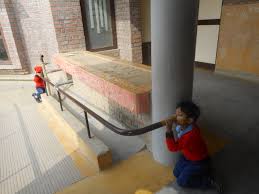- Proximity of Care Design Guide

- Oct 23, 2020
- 1 min read
Updated: Mar 5, 2021
Building as Learning Aid
This educational infrastructure program transforms the architectural elements of schools into assets for playful learning resources.
The intervention increases the opportunities of learning through built environment resources, improving pupil and teacher motivation and engagement with the learning environment.
Location India
Organisation
VINYÃS Centre for Architectural Research & Design
Partner organisations
UNICEF
Beneficiary
Students and caregivers
Scale of catchment
Neighbourhood
Built environment component Educational infrastructure
INTERVENTION DESIGN LEARNINGS
Spatial/physical
Ordinary elements of infrastructures (i.e. school buildings, windows, doors and stairs) can be given a second stimulation or educational purpose.
Visual/Aesthetic
An equilibrium between spaces being loaded with stimuli yet not oversaturated.
Technology
Low tech approach with low cost interventions on already existing educational infrastructures can achieve relevant impacts.
Process
Flexible open-ended design approach allows for easy replication in other schools and scaling up.
Implementation learnings
(1) Targeting the needs and demands of both students and teachers makes the same intervention design twice as effective.
(2) Piloting and later getting support from governments and international agencies can contribute to an effectively scale up process.
Source:









Comments